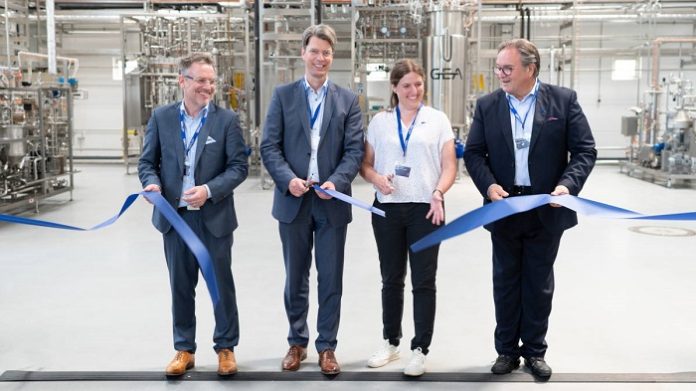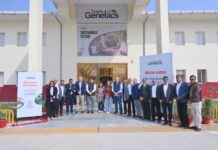
GEA, one of the world’s largest systems suppliers for the food, beverage and pharmaceutical sectors, has inaugurated its New Food Application and Technology Center of Excellence (ATC) in Hildesheim, Germany, as a central hub for piloting processes and products for the alternative protein industry.
The shift to plant-based foods, cultivated meat and products such as microbially produced dairy proteins promises to feed future generations in a climate-friendly way. At the new technology center, GEA’s new food experts will be using a cell cultivation and fermentation pilot line to fast-track innovations from the lab to commercial-scale manufacturing, the company said in a release.

The center houses a pilot plant for the production of sustainable alternatives to meat, milk, seafood and eggs through microbial fermentation and cell cultivation. At the center, GEA customers will be enabled to prepare processes and products for commercial production. It complements other GEA new food centers of excellence, including for bioreactors (Hildesheim, Germany, and Skanderborg, Denmark) and cell separation (Oelde, Germany).
Technology for commercial feasibility
The new testing platform at the ATC bridges the gap between the test bench and industrial-scale production without customers having to invest in large-scale plant from the outset.
“Establishing and scaling up a new food production facility is a major task,” said Heinz Jürgen Kroner, senior vice president, New Food at GEA. “In many cases, new food producers are still stuck at the lab scale – with the hygiene, aseptic and process requirements that involves. On the other hand, industrial-scale manufacturing presents much greater technical and financial challenges. At the ATC, our process experts explore the potential for mass production in order to make this step manageable for food manufacturers. Ultimately, GEA and our customers want to work together on the development of safe, affordable New Food products for consumers.”
Rethinking meat and dairy products
With cell-based meat alternatives now making their way onto restaurant tables, the research focus is turning to precision fermentation for milk proteins. One of GEA’s first customers in this field is Imagindairy, a scale-up from Israel.
Speaking at the opening event, the company’s CEO Eyal Afergan said, “We want to make dairy products without harming the planet. To make that happen, we harness the ancient art of fermentation and combine it with science. This lets us create milk proteins with the taste, functionality, mouthfeel and nutritional value that we love about milk. Together with GEA, we can pave the way to bringing this innovation faster to the market, with the highest possible quality standards.”
Alternatively sourced proteins can help reduce the environmental impact of our food system and help feed the world’s growing population. The shift to new food is going hand in hand with the development of regenerative agriculture.
New food: growth driver
GEA’s new food activities unite the company’s sustainability agenda with the innovative capacity of one of the food industry’s leading technology providers. That’s why new food has been identified as one of the growth drivers in the GEA Mission 26 strategy. A dedicated New Food business unit has been furthering the development of cell-based protein synthesis since 2022.
IndiFoodBev — authentic, impactful and influential
An English-language food and beverage processing and packaging industry B2B platform in print and web, IndiFoodBev is in its third year of publication. It is said that the Indian food and beverage industries represent approximately US$ 900 billion in revenues which implies more than 20% of the country’s GDP. Eliminating the wastage on the farmside can help to deliver more protein to a higher number of the population apart from generating sizable exports. The savings in soil, seeds, water, fertilizer, energy and ultimately food and nutrition could be the most immense contribution that country is poised to make to the moderation of climate change.
To improve your marketing and grow sales to the food and beverage processing and packaging industry, talk to us. Our research and consulting company IppStar [www.ippstar.org] can assess your potential and addressable markets in light of the competition. We can discuss marketing, communication, and sales strategies for market entry and growth.
Suppliers and service providers with a strategy and budget for targeted marketing can discuss using our hybrid print, web, video, and social media channels to create brand recognition linked to market relevance. Our technical writers are ready to meet you and your customers for content.
The second largest producer of fruit and vegetables in the world is continuously expanding processing capacities and delivery systems with appropriate innovative technologies. We cover product and consumer trends, nutrition, processing, research, equipment and packaging from farm to thali. Get our 2025 media kit and recalibrate your role in this dynamic market. Enhance your visibility and relevance to existing markets and turn potential customers into conversations. Ask for a sample copy of our bi-monthly in print or our weekly IndiFoodBev eZine each Wednesday.
For editorial info@ippgroup.in — for advertisement ads1@ippgroup.in and for subscriptions subscription@ippgroup.in
Naresh Khanna – 10 February 2025
Subscribe Now










